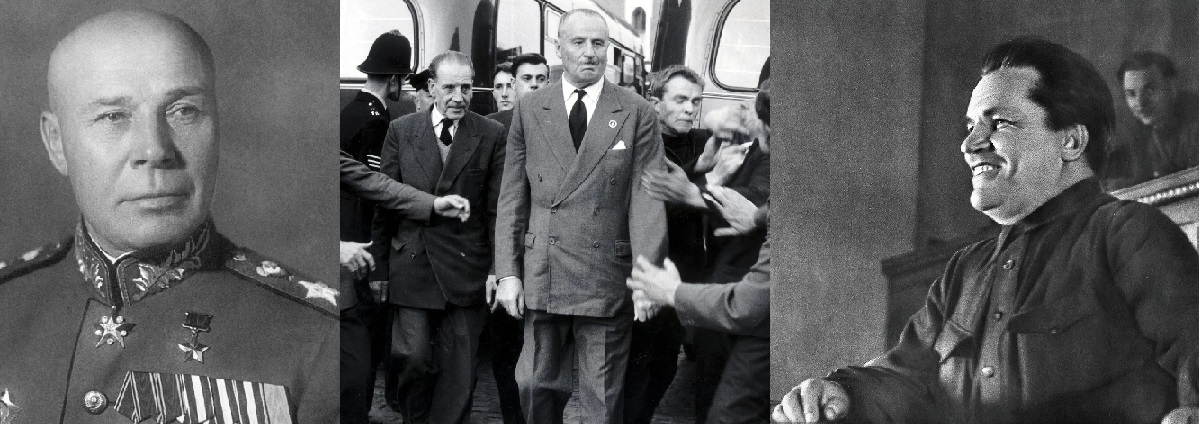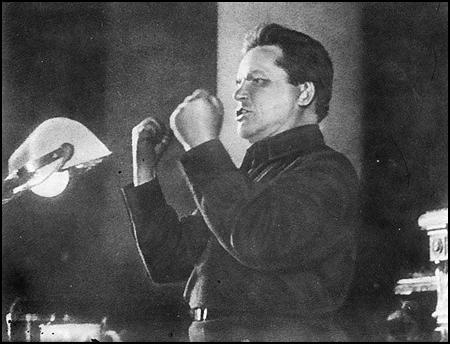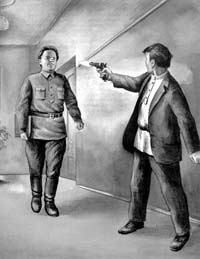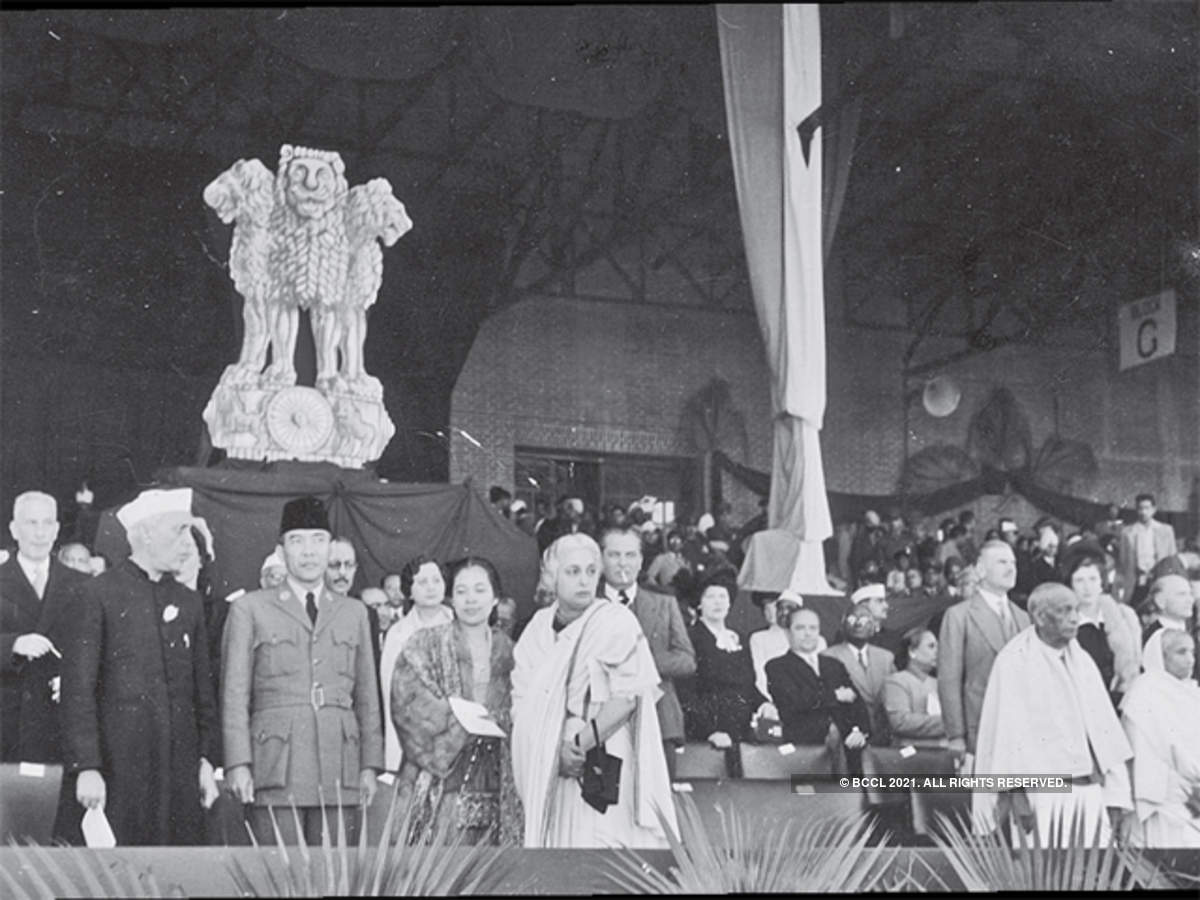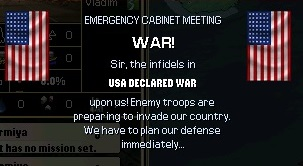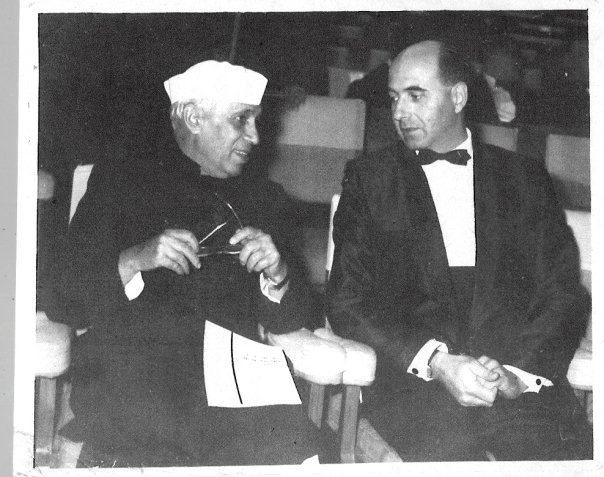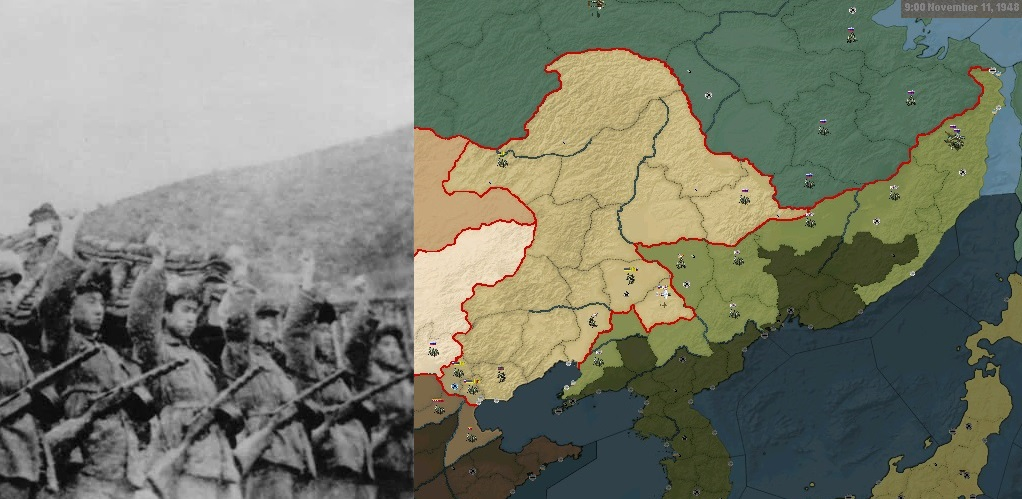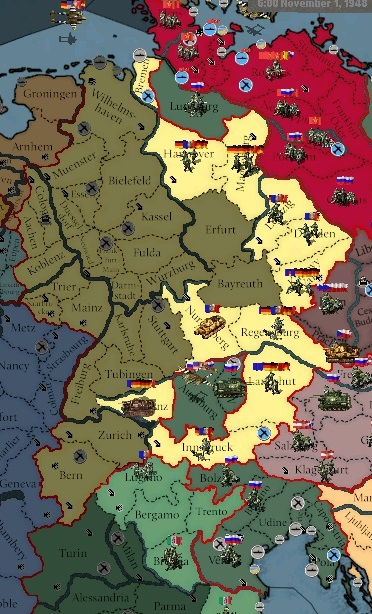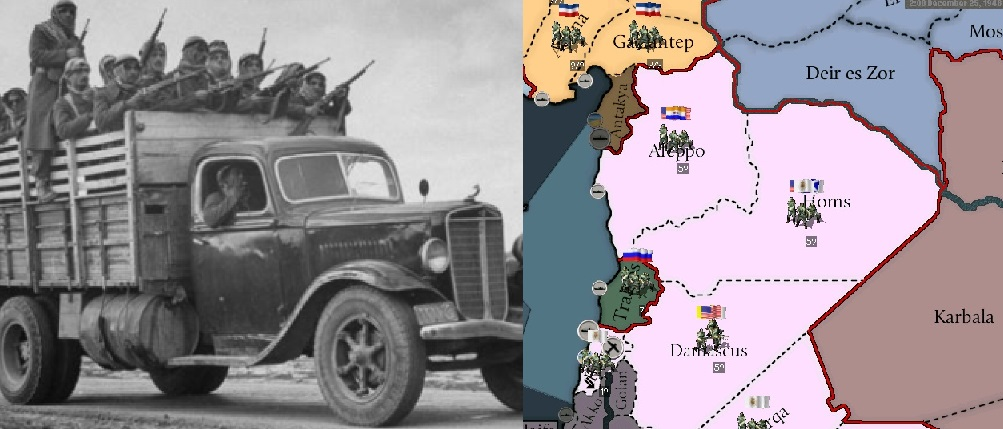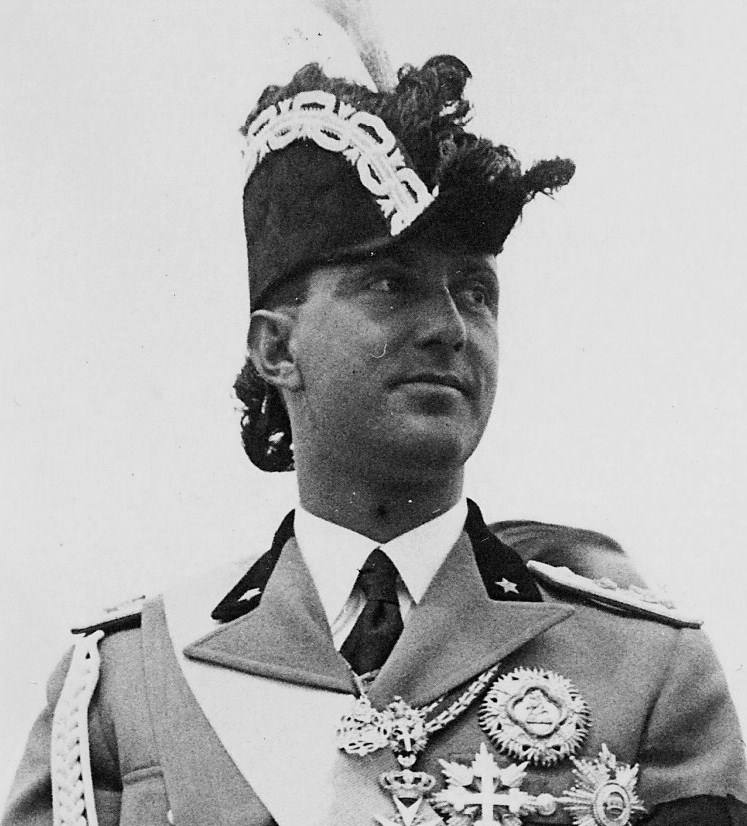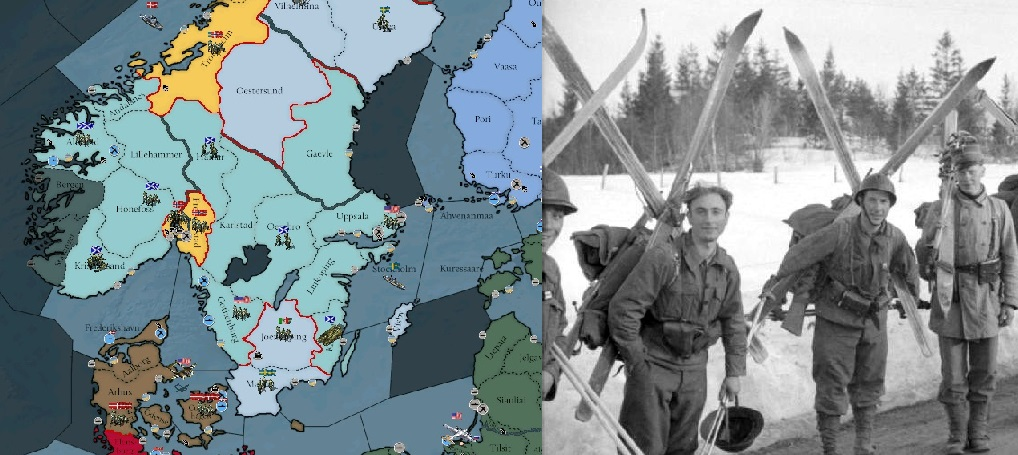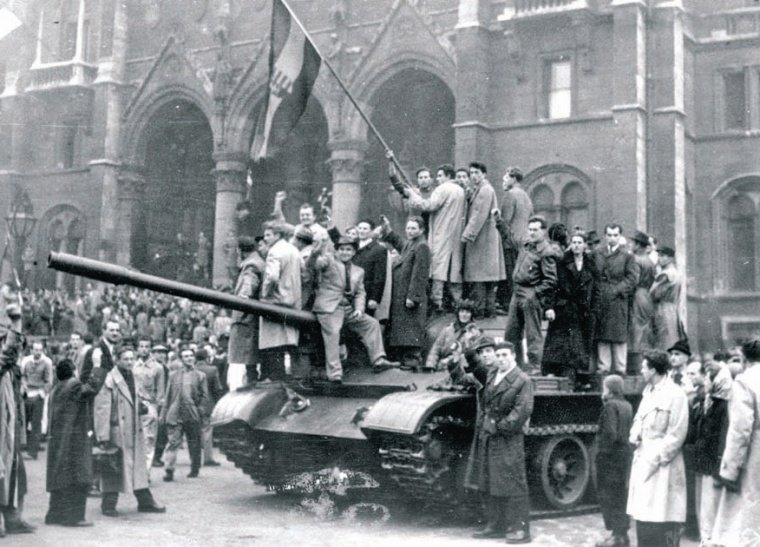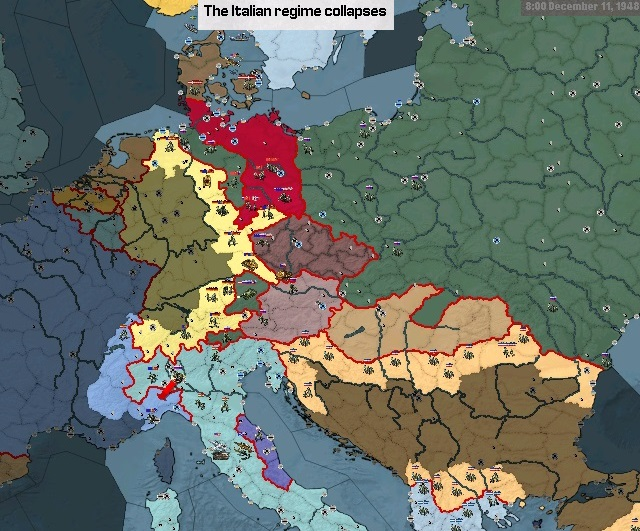1947-1948 – After Ozymandias
The death of the great Vozhd was followed by an outpouring of genuine mass grief across the Russian lands as scores broke down in tears, unable to contemplate a future without the man who had guided the nation for so long. At his funeral in Kiev more than three million streamed in from the provinces to see Boris Makarov’s body in state, while two million more would come to see it during a grand procession that took it through Minsk, Lvov, Warsaw and Gdansk on its way to its final resting place in Pomerania – where a private Samaritan religious ceremony was observed by his nonagenarian mother. Out of sight of the mourners, a power struggle was already under way behind the scenes before Makarov’s body had even turned cold.
Left to Right: Vladimir Petrov, Feodor Golikov and Aleksei Popov
Throughout his rule, Boris Makarov had deliberately avoided anointing an undisputed successor. This left the future of the Republic an open question. There were three leading candidates to take the nation forward – Feodor Golikov, the veteran head of the secret police, Vladimir Petrov, a senior Field Marshall and hero from the war, and Aleksei Popov, a favourite of the fallen Vozhd and the popular figure among the party elite.
The eldest of the three, Golikov had the longest political history – having risen from a blackshirt street thug in the 1910s to a local organiser involved in atrocities like the Felaket in the 1920s before creating the MGB, Russia’s secret police, and directing the purges of the early 1930s. Thereafter, he served in a number of high ranking government roles, while never relinquishing control over the MGB – an organisation whose size and scope continuously grew, with control over significant elements of the economy, entire military divisions and the largest network of totalitarian surveillance and control in world history. His star had started to fade in the mid-1940s. As a Muscovite, Makarov had never fully trusted him as a part of his personal circle, while Golikov’s decision to withdraw from Kiev during the city’s siege in 1942 had stained him as a coward in the Vozhd’s eyes, unsuitable to rule. Although he had survived the postwar purges, never wavering from undying loyalty to the leader and being seen as a useful and effective brute, Makarov made no secret of his personal feelings towards him, in one cabinet meeting in 1946 putting him in his place by saying “your ambitions are grand, but they exceed your abilities, which are puny”. It was rumoured in some circles that Makarov’s death months later had not been an accident at all, but had the fingerprints of MGB agents upon it.
Ironically, Petrov owed his career to Golikov. During the purges of the early 1930s Russia had destroyed its entire military leadership, providing the space for ambitious, talented, and ideologically disciplined young men to rise rapidly through the ranks. The outbreak of the war had given him further opportunities to rise, with many of his contemporaries proving incapable when finally facing the heat of battle. By 1942 he was in command of the entire Ukrainian Front and oversaw both victory in the Battle of Kiev, and the successes of the 1943 offensives. In 1944 he was moved to Central Asia to command the eastern sector of the Russian army that captured Delhi and advanced along the Ganges into Bengal and Burma. The reorganisation of the armed forces along Radical ideological lines in the 1930s had made the military an inherently more political entity – closely intertwined with the Radical Party itself. As such, the army was heavily involved in internal debates within the party and Petrov was the most senior amongst them. Politically, he despised Golikov – seeing the MGB as an overmighty rival of the army and blaming him personally for escalating the destabilising postwar wave of purges – and feared that Russia was not yet prepared for another war with either China or America so soon after the last.
The final major rider for the leadership for Aleksei Popov, the man who was the closest to an handpicked successor that Makarov ever had. Throughout his political life Makarov’s closest circle had been dominated by Pomeranians and Samaritans. It was little surprise that over the decades of Radical rule this clique had come to dominate the upper ranks of the party – even if it had often borne the brunt of internal purges. Popov, just 42 in 1947, was the darling of the Samaritan Clique. Building a close personal bond with Makarov from a young age when he served as his personal aide during the late 1920s, the Vozhd doted on him as if he were his son. The purges of the early 1930s catapulted him into senior positions while still in his 20s, serving as party boss in Minsk and then making his way into ministerial positions within the government. During the war he gained prestige by remaining in Kiev alongside Makarov while many withdrew to the east. After the war his influence had greatly expanded after he was given overarching responsibility for overseeing much of the economic reconstruction effort – allowing him to develop rich lines of patronage throughout the party stretching down the grassroots. Popov was regarded as something of a conservative figure who would preserve the influence of Samaritan Clique and threat of further purges to the party elite.
As the battle to succeed Makarov got underway, Popov quickly emerged as the frontrunner. At the Vozhd’s public funeral in Kiev, Popov delivered a stunning speech that lionised the career of the fallen leader, achievements of his revolution and the sacrifices of the War, while outlining a thinly veiled manifesto of a future filled with economic prosperity and national greatness – receiving thunderous applause from both the public and party cadres alike. Behind closed doors, Popov’s charm and connections across the party elite ensured that he was able to rally their support behind his cause. Most importantly of all, he agreed an alliance with Marshall Petrov – granting him significant autonomy to control the armed forces in exchange for his political support. Golikov had been outmanoeuvred and isolated, his removal from government and control over the secret police now seemed inevitable.
Most dangerous when cornered, Golikov knew he would have to act, and quickly, if he was to avoid oblivion and likely death at the hands of his opponents. With little hope of winning a direct popularity contest with Popov, or wielding the loyalty of the party elite, he had spent some time cultivating alliances among the dissatisfied elements of the Russian elite – those shut out from the golden circle of the Samaritan Clique, with stalling careers and unexceptional future prospects. Most importantly, this included a faction of the armed forces that resented the influence of Marshall Petrov, and his pretensions to speak for the entire army. With this cabal of malcontents, the spider of Radical Russia would strike.
At 2am on March 22nd, weeks after Makarov’s death, MGB units shut down all road, rail, telephone and telegraph connections between Kiev and the rest of the Republic. In the following hours secret police agents launched a wave of assassinations with surgical precision. Popov, saw three heavily armoured men burst into his bedroom and riddle him with bullets. Marshall Petrov, initially evaded the killers who broke into his home in the dead of night after he spent the night at his mistress’ apartment but was found and killed there a little over an hour later. By the morning hundreds of allies of Popov and Petrov had been killed and the citizens of Kiev awoke to the site of tanks in the street as three divisions loyal to Golikov-aligned generals paraded down the streets and loudspeakers blasted out the demand that people stay in their homes. That evening Feodor Golikov spoke to the nation on the airwaves that Aleksei Popov had been conspiring with counter-revolutionary forces abroad to reinstate the Tsar and destroy the legacy of the national revolution, and that this disaster had been averted. Russia had a new master.
The dramatic ructions in Russia in the month after Boris Makarov’s death had great significance far beyond the Republic’s borders. While prior to the Second World War revolutionary far right nationalism in the Radical-mould had been a minority current beyond Russia, in the conflict’s aftermath its was a vibrant international force. Radical nationalism had a constellation of currents within it – with many small subservient Radical Party created along Kievian-lines to administer Russian satellite states across Europe and the Middle East, more traditional Khanates with strong ethno-nationalist currents in the Mongol lands, a more independent Indian Radical regime, a Serbian monarchy that had drifted towards the far right under Russian influence and to a lesser extent the distinct nationalist revolution in China that had inspired wider anti-colonialist movements. Within this world Boris Makarov had emerged as a figure of immense respect and stature – the eldest, first and most successful leader of national revolution. His demise, the unedifying scenes in Kiev and the rise of the less statesmanlike and popular Feodor Golikov removed much of Russia’s intangible influence over the wider movement.
Nowhere was this more apparent and significant than in India. In one of his last great political projects, Boris Makarov had attempted to build an indigenous Radical revolution in India in the aftermath of the country’s conquest by Russia in 1944-45. In this he had only ever truly been half successful. While an Indian Radical Party was forged from Hindu nationalists and Russophiles, it was never as closely aligned to Kiev as the Vozhd had hoped. Indeed, while the Indian Radicals eagerly adopted the Russian playbook of the terrorisation of minorities and political opponents, the adoption of generous welfare policies and economic interventionism, they had found it difficult to restrain voices demanding traditional Indian nationalist goals – independence from foreign influence, unification of all ethnic Indian lands and a central role for India in the wider Hindu world. All these goals rankled with Russian influence. Golikov’s coup in Kiev provided an opportunity for the Indian regime to distance itself from their masters – as Delhi expressed significant concern over the manner of the transfer of power and quietly gave asylum to Popovites fleeing from Russia.
While Golikov spent the months after his seizure of power consolidating his rule and imprinting his, somewhat unpopular, authority across his sprawling empire, he faced a tremendous geopolitical challenge in the Far East. The Beijing Question had become the central focus of Chinese politics since the end of the war with Japan, and now, perceiving weakness, Chinese nationalists ramped up their agitation. As Chinese troops probed the defences of Russia’s allied Khanates, insurgents slipped across the porous border – marking the beginning of what was in effect an undeclared war. In the Chinese populated lands in and around Beijing, the nationalist cause hit a cord among a people tired of foreign rule. The aggression of the Chinese and anger of Beijing culminated in a great insurrection in the city beginning in early September 1948. With Russian troops being required to restore order, images seeped out into the wider world of tanks rolling down the streets of Beijing firing upon civilians and meting out destruction. Powered by a wave of popular anger, China invaded on September 18th, launching a massive assault on the historic city.
The outbreak of fighting around Beijing sent the world hurtling towards another global conflict, just three years over the conclusion of the last. Although Russia’s diplomats desperately whirled around Europe and North America attempting to localise the conflict, in New Cordoba the momentum towards war had grown unstoppable as the Tatar lobby pushed relentlessly for a great Jihad against the evil of Russian Radicalism. On October 6th 1948 the United States announced a declaration of war against the Russian Republic and its allies. The Third World War had begun.



